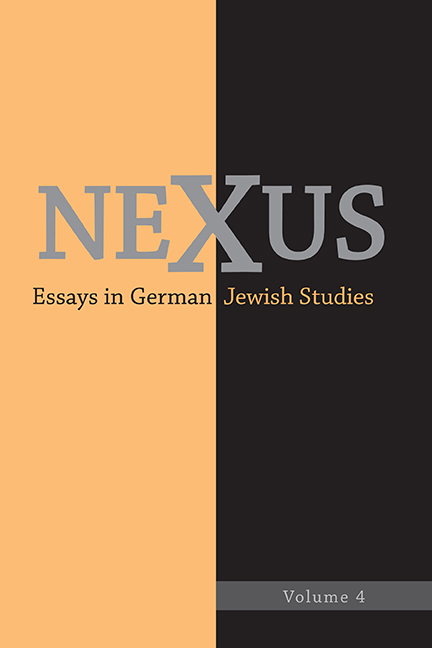Book contents
- Frontmatter
- Dedication
- Contents
- Acknowledgments
- Introduction
- Kafka, Childhood, and History
- The Black, White, and Gray Zones of Schindler's List: Steven Spielberg with Primo Levi
- Nexus Forum: A German Life: Edited and Introduced by Brad Prager
- Special Section on George Tabori: Edited and Introduced by Martin Kagel
- Introduction to the Special Section on George Tabori
- Waiting for The Cannibals: George Tabori's Post-Holocaust Play
- “Sacrifice is the test for loyalty, Goldberg.” Sacrifice and the Passion of Christ in George Tabori's Comedy The Goldberg-Variations
- “Empathy for the Entire Spectrum of Selves and Others”: George Tabori's Humanism
- A Triple Act of Translation: George Tabori and Brecht on Brecht
- My War Story: Tabori, Brecht, and Vietnam
- My Life with George
My War Story: Tabori, Brecht, and Vietnam
from Special Section on George Tabori: Edited and Introduced by Martin Kagel
Published online by Cambridge University Press: 31 August 2018
- Frontmatter
- Dedication
- Contents
- Acknowledgments
- Introduction
- Kafka, Childhood, and History
- The Black, White, and Gray Zones of Schindler's List: Steven Spielberg with Primo Levi
- Nexus Forum: A German Life: Edited and Introduced by Brad Prager
- Special Section on George Tabori: Edited and Introduced by Martin Kagel
- Introduction to the Special Section on George Tabori
- Waiting for The Cannibals: George Tabori's Post-Holocaust Play
- “Sacrifice is the test for loyalty, Goldberg.” Sacrifice and the Passion of Christ in George Tabori's Comedy The Goldberg-Variations
- “Empathy for the Entire Spectrum of Selves and Others”: George Tabori's Humanism
- A Triple Act of Translation: George Tabori and Brecht on Brecht
- My War Story: Tabori, Brecht, and Vietnam
- My Life with George
Summary
“MY WAR STORY” is a true story, although some of the details might be a bit sketchy due to the effects of age and a deficient filing system. The story I have to tell, I hope, will be more than a stroll down memory lane; it describes an intense, months-long political and cultural confrontation that occurred during a time of maximum turbulence in the history of my country, my city, and my university. It was a time when, for me, a near-perfect alignment of life and art became both real and excitingly relevant. This, briefly, is my war story.
I was hired at the University of Wisconsin-Madison in the fall of 1968 into what was then called the Department of Speech. That year and the next several years were filled with passion, fear, and violence; in the background, influencing all events and actions, was the American involvement in the Vietnam War with its continuing escalation of human and environmental destruction. In February 1969, the university erupted in furious discord when the campus was closed as a result of a student strike. At issue was the creation of a Department of Black Studies as demanded by the Black Peoples’ Alliance and their supporters. Pushing back against a recalcitrant university administration that had responded to the demand with delay and denial, thousands of students denounced their university's negative response (as they saw it) through tactics that included demonstrations and very disorderly conduct.
Many of the details I am relating are derived from the reports of student journalists whose own war stories appeared with passionate urgency in the student newspaper, The Daily Cardinal, which, in addition to covering the situation in Madison, referred to demonstrations taking place at colleges and universities throughout the United States, among them the University of California-Berkeley, Rutgers, UW-Milwaukee, and San Francisco State, evidence that student outrage and activism were a nationwide phenomenon. When a riot broke out on February 13, 1969, following the student strike, and the Wisconsin National Guard was summoned to restore order, the Cardinal quoted one state legislator as saying: “These kids are against our whole system and they want to tear down our society by filth and corruption.”
- Type
- Chapter
- Information
- Nexus 4Essays in German Jewish Studies, pp. 177 - 188Publisher: Boydell & BrewerPrint publication year: 2018



